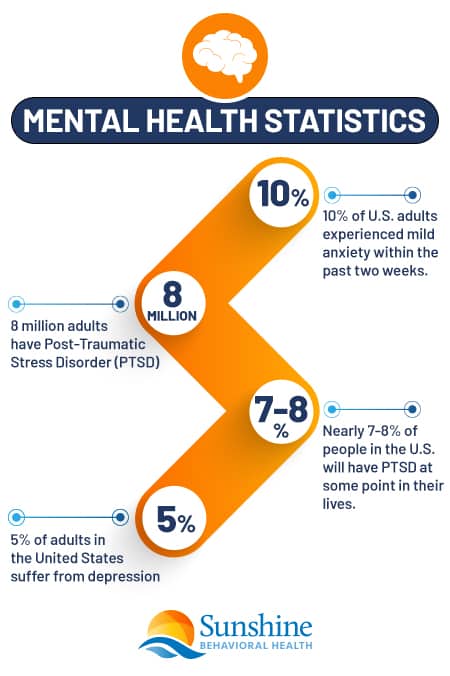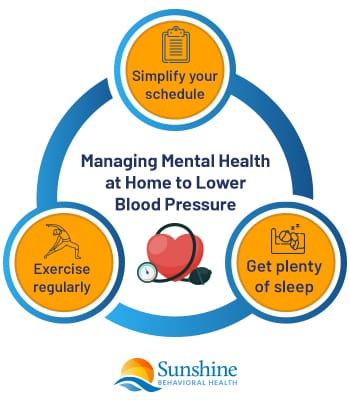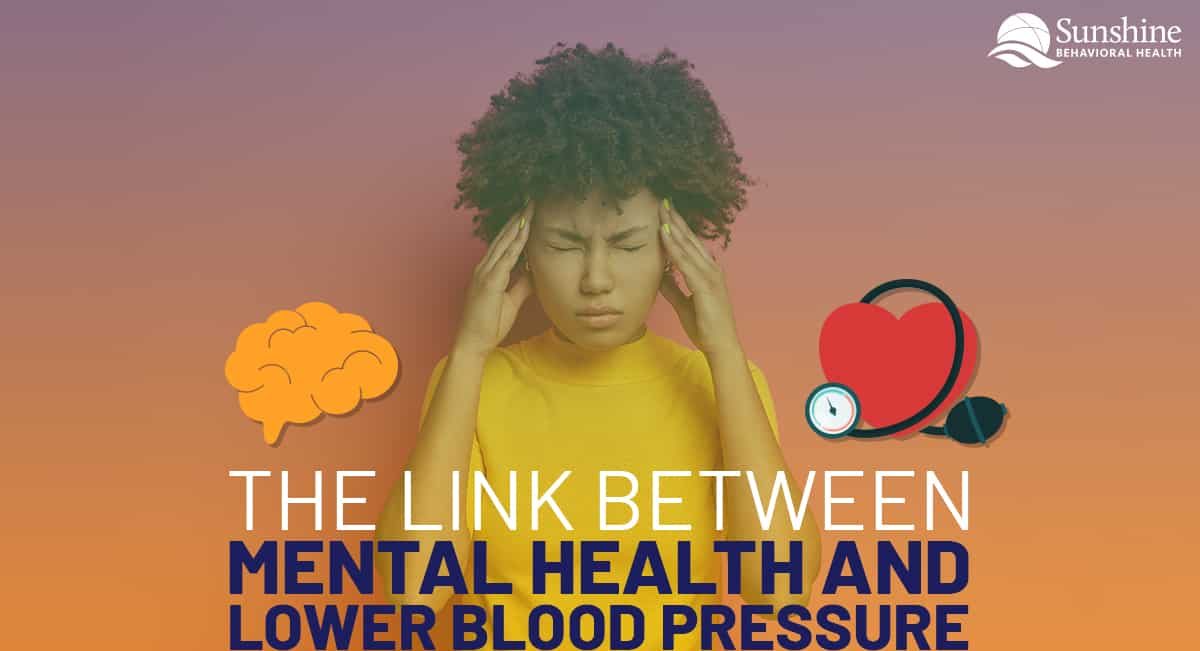In looking to improve your overall health it’s important to think about not only your physical health but your mental health as well.
A holistic approach to health care can be a solid approach because the two are interrelated. If people have good physical health, their mental health should benefit too. The result should be more confidence in themselves, in their bodies, and in their abilities to live healthy lives. In addition, if people have good mental health, they may have an easier time engaging in healthy habits that also can benefit their physical health.
One of the most common chronic medical conditions is high blood pressure. Even though many people think about their heart when they think about high blood pressure, there is a link between high blood pressure and mental health. It is important to take a closer look at this relationship because it can have an impact on mental and physical health.
Defining High Blood Pressure: What Does This Mean?
Before discussing high blood pressure, it’s good to understand what this is. High blood pressure refers to the pressure inside the body’s blood vessels. Our bodies use a network of arteries and veins to transport oxygen and nutrients to our organs.
If the pressure inside our vessels is too high, it can lead to a wide variety of complications. That’s why doctors and nurses check our blood pressure every time we go to the doctor’s office, the emergency room, or the hospital.
When medical professionals measure our blood pressure, they use two numbers. The top number in the reading is called the systolic number. The bottom number is called the diastolic number.
Both numbers matter because they depict what happens during an entire heart cycle. Systolic blood pressure measures when our hearts contract, or pump blood. Then, when our hearts relax, our blood pressure drops slightly, yielding the diastolic number.
Medical professionals classify high blood pressure into multiple categories. They include:
- Normal blood pressure is defined as a systolic blood pressure of less than 120 and a diastolic pressure of less than 80 (120/80).
- Elevated blood pressure is defined as a systolic blood pressure between 120 and 129, and a diastolic blood pressure of less than 80.
- Stage 1 hypertension (high blood pressure) is defined as a systolic blood pressure between 130 and 139, or a diastolic blood pressure between 80 and 89.
- Stage 2 hypertension (high blood pressure) is defined as a systolic blood pressure of 140 or higher or a diastolic blood pressure of 90 or higher.
- A systolic blood pressure greater than 180 or a diastolic blood pressure greater than 120 is deemed a hypertensive crisis and is a medical emergency.
People who have elevated blood pressure may not experience any symptoms. That is why doctors check people’s blood pressure every time they visit their offices. If people do not check their blood pressure, they may not realize that they have high blood pressure at all.

Complications of High Blood Pressure
Similar to other medical conditions, blood pressure ranges widely in terms of scope and severity. Some people may have higher blood pressure than others. As a result, some people may have different complications.
Unless someone is suffering from a hypertensive crisis, immediate complications of elevated blood pressure are unusual. Even so, several long-term complications can be serious. High blood pressure can:
- Cause someone to lose their vision.
- Increase someone’s risk of having a stroke.
- Increase someone’s risk of suffering a heart attack.
- Lead to long-term heart failure, which occurs when the heart is unable to pump enough blood to meet the demands of the body.
- Lead to kidney disease and kidney failure.
- Cause sexual dysfunction.
For these reasons, people need to make sure they keep their blood pressure in check. People should also listen to their doctors when it comes to managing high blood pressure.
How Common Is High Blood Pressure?
High blood pressure is more common than many people realize. According to statistics that have been published by the Centers for Disease Control and Prevention (CDC):
- In 2018 alone, close to 500,000 deaths in the United States listed high blood pressure as a primary or contributing factor.
- Close to half of all adults in the United States — 108 million people — have at stage 1 hypertension or beyond.
- Fewer than 25% of adults in the United States have their hypertension under control.
- High blood pressure is responsible for more than $131 billion in medical expenses every year.
Due to the damage that high blood pressure can cause, people need to understand how they can keep their blood pressure under control. This means understanding mental health as well.
Mental Health and High Blood Pressure
 There are numerous factors related to high blood pressure, and one of them can be mental health. Even short-term mental health issues can cause spikes in blood pressure, leading to eventual cardiovascular complications.
There are numerous factors related to high blood pressure, and one of them can be mental health. Even short-term mental health issues can cause spikes in blood pressure, leading to eventual cardiovascular complications.
When people are in stressful situations, their bodies produce a variety of hormones. The hormones can increase heart rate. More heart activity can produce extra blood, and the blood vessels may begin to narrow and lead to high blood pressure.
Researchers are still investigating the connection between mental health and blood pressure, but it appears that reacting to stressful situations in unhealthy ways can also raise one’s blood pressure.
Certain mental health conditions may be linked to high blood pressure, including:
- Isolation from family members and friends
- Anxiety
- Depression
In addition, many mental health conditions are more common than people realize:
- Generalized anxiety disorder (GAD) can range from mild to severe. Nearly 10% of U.S. adults experienced mild anxiety within the past two weeks.
- Post-traumatic stress disorder (PTSD) impacts close to eight million adults in any given year. Nearly seven to eight percent of people in the U.S. experience PTSD at some point in their lives.
- Close to five percent of adults in the United States experience depression
Since mental health issues are so common, it’s important to understand the relationship between mental health and high blood pressure. Even though acute episodes of stress can lead to heart rate spikes and drive up blood pressure, it’s also important to examine the long-term complications.
Because of the way people respond to stressful situations, there is a close association between mental health issues and blood pressure. Unfortunately, many who suffer from mental health issues, including anxiety and depression, do not have access to adequate mental health resources. As a result, they end up coping with mental health problems in unhealthy ways. Some people respond to stressful situations by:
- Smoking cigarettes.
- Chewing tobacco.
- Drinking excessive amounts of alcohol including wine, beer, and liquor.
- Eating unhealthy foods.
- Using recreational drugs such as cocaine, heroin, and methamphetamine (meth).
- Abusing prescription medications.
Such behaviors have the potential to increase blood pressure. Although they may not lead to acute spikes in blood pressure, people who engage in these behaviors long-term can develop hypertension.
Unhealthy habits also place people at greater risk of developing physical complications from high blood pressure. The complications can include heart attacks or strokes, aneurysms, heart failure, kidney problems, and more.
That is why it’s vital to seek the care of trained mental health professionals who can help people manage their mental health issues in healthier ways.
Managing Mental Health at Home to Lower Blood Pressure
People who are looking for ways to manage their mental health at home may be able to lower their blood pressure. If they use stress management strategies, they may be able to avoid acute heart rate spikes. This can keep their blood pressure lower and help them avoid long-term complications.
Although it might take some practice, people can master a variety of stress management techniques that can change their behaviors and habits. The changes can keep their blood pressure in a healthy range.
Some activities and changes people can make manage their mental health include:
- Simplifying schedules. Many people feel stressed because they feel like they are rushing everywhere. If they feel that way, people could take a few minutes to analyze their calendars and to-do lists. They can look for activities that take a significant amount of time, but are not that important to them. If they manage their schedules appropriately, they might be able to eliminate these activities and reduce their stress levels.
- Pausing for a few moments before moving to the next items on their to-do lists. By taking a few, deep, slow breaths, people might find it easier to relax. Taking some time to regroup might help people manage their stress.
- Exercising regularly. Physical activity is a natural stress reliever. Exercise releases endorphins, which can make people feel happy and less stressed. Regular fitness can help people better control their stress and improve their mental health. By improving both physical and mental health, exercise can help lower blood pressure.
- Practicing yoga and meditation can help people calm people’s minds, dissipate stress, and lower blood pressure. People can engage in these activities by themselves or with others.
- Getting plenty of sleep. There is a direct relationship between inadequate sleep and a significant amount of stress. People who are having a difficult time falling asleep or staying asleep should take a closer look at their sleep hygiene. Going to bed and waking up at the same time every day can restore natural rhythm, making it easier to fall asleep and stay asleep.
The above suggestions are a few basic ways people can manage their mental health at home. But if they’re dealing with anxiety, depression, bipolar disorder, or other mental health conditions that could be leading to stress and elevated blood pressure, people should also consider reaching out to trained mental health professionals.
A Mental Health Professional Can Help
 Working with mental health professionals can help people lower their blood pressure. A few examples include:
Working with mental health professionals can help people lower their blood pressure. A few examples include:
- Therapy. By exploring the root cause of why people are feeling anxious or depressed, mental health professionals can help people manage their symptoms effectively. People who are better able to manage anxiety and depression may be able to manage their blood pressure better. Mental health professionals might use multiple types of therapy.
- Medication. Mental health professionals can help people find medications to help them manage their mental health in ways that could reduce their blood pressure. Mental health professionals can work with medical professionals to find medications that won’t affect blood pressure.
- Education. Clients can work with mental health professionals to help develop coping skills for certain situations. If people are feeling significant amounts of stress, they can use these coping tools to address their anxiety or stress as well as manage their blood pressure and other conditions.
When people have questions or concerns about their mental health, it’s a good idea to contact professionals who can help. Managing mental health can help people better control their blood pressure.
Blood Pressure Management and Mental Health
Ultimately, there is a strong connection between blood pressure and mental health. Ideally, people can manage both as part of a healthy lifestyle.
In addition to exercising regularly and eating a healthy diet to control blood pressure, maintaining mental health is important. There are professionals who can help people address their overall mental health. People don’t have to manage their physical or mental health alone.
Sources
Medical disclaimer:
Sunshine Behavioral Health strives to help people who are facing substance abuse, addiction, mental health disorders, or a combination of these conditions. It does this by providing compassionate care and evidence-based content that addresses health, treatment, and recovery.
Licensed medical professionals review material we publish on our site. The material is not a substitute for qualified medical diagnoses, treatment, or advice. It should not be used to replace the suggestions of your personal physician or other health care professionals.







